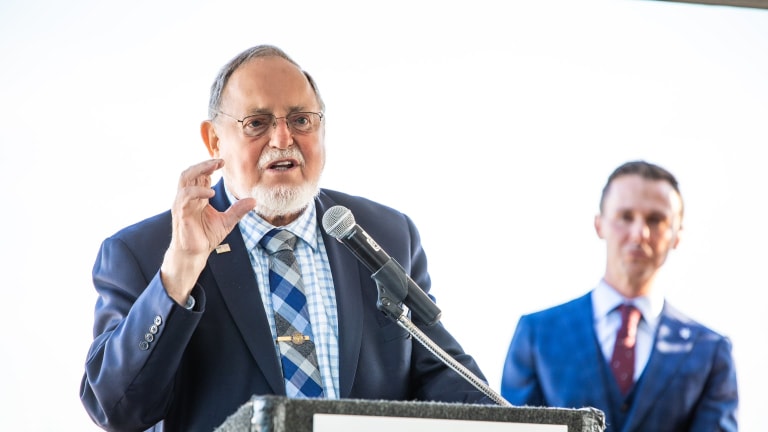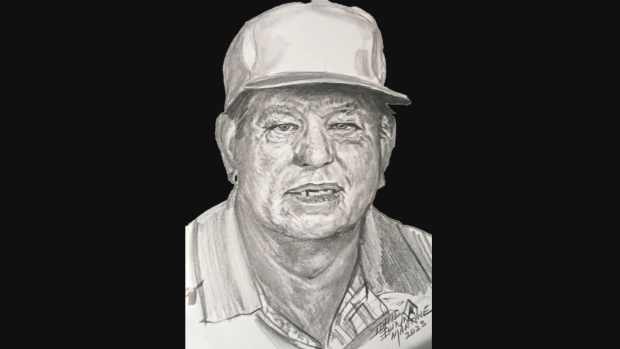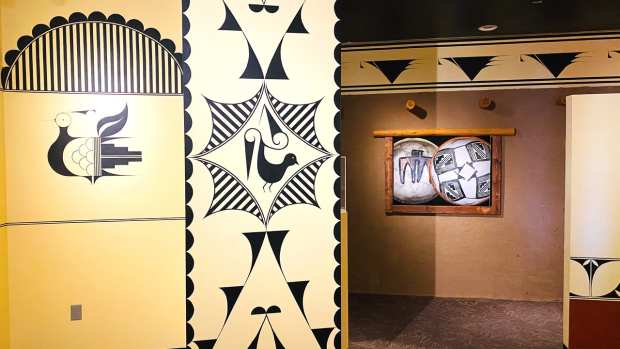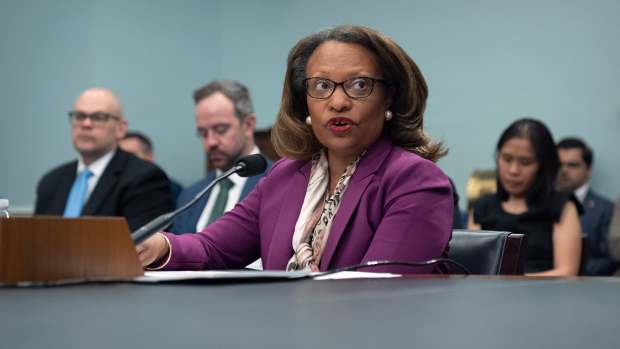
Don Young's legacy in Indian Country and beyond
Mary Annette Pember
Indian Country Today
Alaska Rep. Don Young, a self-described conservative who was an early supporter for the trans-Alaska pipeline system in 1973 and recently supported opening lands within the Arctic National Wildlife Refuge for oil exploration, seemed an unlikely champion for Alaska Native rights.
The Alaska Federation of Natives described Young as “the Congressman for all Alaska,” in a written statement.
“In the coming days, the Congressman’s accomplishments in the United States House of Representatives will be compiled for all to reflect on. The list will be long. The achievements he championed from concept to completion on behalf of Alaska Natives will not be forgotten.
However, his friendship is what the Alaska Native community will miss most. Congressman Young’s word was his bond, and he was not afraid to speak his mind. No one ever had to second guess where they stood with him.
“We did not always agree,” said Julie Kitka, the organization’s president, “However, he was always willing to listen. And if he could help, he would.” Kitka remembers how the Congressman would often pick up the telephone and call a cabinet member or federal official to “take care of it” right in the middle of their meetings. “That was how much he cared about the Alaska Native community,” Kitka added.
AFN Co-Chair Joe Nelson recalls Congressman Young’s appreciation and deep understanding of Alaska’s unique forms of tribal self-governance and Native self-determination and how he made it his mission to make sure the rest of Washington, DC did as well. Nelson surmised, “we could not have asked for a better advocate,” according to the statement.
Leaders at the Arctic Slope Regional Corporation described Young as a partner in the region and tireless advocate for all of Alaska and a fierce advocate for Alaska Native rights, in a statement.
Don Young, who was the longest-serving Republican in the history of the U.S. House died at the age of 88.
His office announced Young’s death in a statement Friday night.
“It’s with heavy hearts and deep sadness that we announce Congressman Don Young (R-AK), the Dean of the House and revered champion for Alaska, passed away today while traveling home to Alaska to be with the state and people that he loved. His beloved wife Anne was by his side,” said the March 18 statement from Young’s congressional office.

At a meeting in Anchorage with the Alaska Native Tribal Health Consortium's (ANTHC) leadership at the Alaska Native Medical Center campus. (Photo from Don Young, Facebook. June 3, 2021)
A cause of death was not provided. Young’s office said details about plans for a celebration of Young’s life were expected in the coming days.
Tributes and condolences for the colorful, often brusque congressman began pouring in immediately after his death was announced, notably from several Native Alaskan leaders and organizations.
President Joe Biden said Saturday that there was no doubt that few legislators left a greater mark on their state than Young.
“Don’s legacy lives on in the infrastructure projects he delighted in steering across Alaska. In the opportunities he advanced for his constituents. In the enhanced protections for Native tribes he championed. His legacy will continue in the America he loved,” Biden said in a statement.
Central Council of Tlingit and Haida Indian Tribes of Alaska wrote on their Twitter account: “He was a champion for Alaska tribes in many ways, including the Violence Against Women Act, transportation, Alaska Native veterans and southeast Alaska landless tribes.”

Don Young meets with Aleut Corporation's President and CEO Skoey Vergen and Aleut’s Communications Director Kate Gilling in his Washington, D.C. office. (Photo from Rep. Don Young, Facebook)
Young, known for decades of steering federal spending to his home state, won $23.7 million for Alaska for water, road and other projects in the government-wide $1.5 trillion spending bill President Biden signed into law this week, according to an analysis of that bill by The Associated Press. It is one of the highest amounts for home-district projects that any House member had in the legislation.
The Alaska congressional member said he wanted his legacy to be one of working for the people. He counted among his career highlights passage of legislation his first year in office that allowed for construction of the trans-Alaska pipeline system, which became the state’s economic lifeline. With that successful pipeline fight, “I found a niche in my life where I enjoy working for the people of Alaska and this nation — primarily the people of Alaska,” Young said in 2016, adding later: “I like the House.”
During his career, he unapologetically supported earmarks as a way to bring home projects and build up infrastructure in a geographically huge state where communities range from big cities to tiny villages; critics deemed earmarks as pork.
Young branded himself a conservative and won support with voters for his stances on gun and hunting rights and a strong military. He made a career out of railing against “extreme environmentalists” and a federal bureaucracy that he saw as locking up Alaska’s mineral, timber and petroleum resources. He said his word was a “gold bond.”
Despite his self-avowed conservatism, Young famously told the Washington Post that then-President Donald Trump should “just shut up,” when Trump threatened to oppose Young after the Congressman voted in favor of the Republican bipartisan infrastructure bill. The bill funneled $3.5 billion to Alaska for federal highway funding and millions in support of harbor and ferry construction.

Rep. Deb Haaland, D-New Mexico, delivers a gift to Rep. Don Young, R-Alaska, before the start of the Senate Committee on Energy and Natural Resources hearing on her nomination to be Interior Secretary, Tuesday, Feb. 23, 2021 on Capitol Hill in Washington. (Jim Watson/Pool via AP)
Young also urged Republicans to support President Biden’s nominee for Secretary of the Interior, Rep. Deb Haaland, despite their disagreements over oil drilling on federal lands. Haaland is the first Native woman, a citizen of the Laguna Pueblo tribe, to head the agency.
Some of Young’s work supporting Alaska Natives include:
Read More
- introducing the Alaska Native Veterans Land Allotment Equity Act in 2016. Passed by voice vote, the Act provides equitable treatment of Alaska Native Vietnam Veterans allowing eligibility for land benefits from the federal government;
- a member of the Subcommittee for Indigenous Peoples of the U.S. and vice chair of the Native American caucus, Young helped the state House pass legislation to combat the nation-wide epidemic of Missing and Murdered Indigenous Women and Girls and was co-sponsor of Savanna’s Act and the House version of the Not Invisible Act in 2020; and
- speaking out in 2022 against the so-called Refuge from Cruel Trapping Act which could have impacts on subsistence trappers, especially Alaska Natives.
He sat through a congressional hearing with his fingers turning blue in a leg-hold trap to demonstrate that trapping was not inhumane, according to the Anchorage Daily News.
Born in California, Young came to Alaska in 1959 and later settled in Fort Yukon, a small community accessible primarily by air at the confluence of the Yukon and Porcupine rivers in the state’s rugged, harsh interior. He held jobs in areas like construction, trapping and commercial fishing. He was a tug and barge operator who delivered supplies to villages along the Yukon River, and he taught fifth grade at a Bureau of Indian Affairs school, according to his biography. He married Lula or 'Lu' Fredson, a citizen of the Gwich’in tribe, and a year later was elected mayor of Fort Yukon. He was later elected to the state Senate where he served for two years before his election for the U.S. House.
In 1972, he was the Republican challenger to Democratic U.S. Rep. Nick Begich. Three weeks before the election, Begich’s plane disappeared on a flight from Anchorage to Juneau. Alaskans reelected Begich anyway.
Begich was declared dead in December 1972, and Young won a close special election in March 1973. Young held the seat until his death. He was running for reelection this year against a field that included one of Begich’s grandsons, Republican Nicholas Begich III.
Diane Benson, Tlingit, ran against Young in 2006 as a Democrat and lost. “He refused to debate me in public,” she recalled. “But my campaign manager and I cornered him into a live debate; he wasn’t a happy camper about that.”
According to Benson, Young wouldn’t debate her because he didn’t feel it was necessary; he knew he’d win anyway.
“We had a very spirited time running against one another,” Benson said. “He didn’t like me calling him to the mat; he was very irritated by my feistiness.”
Benson received 42 percent of the vote, she said.
She opposed Young’s support for the war in Iraq after her son was injured there and was critical of his lack of support for Iraq war veterans.
Benson also opposed opening up the Arctic National Wildlife Refuge for oil exploration.
In the end, however, Benson and Young developed a mutual respect and a “kind of friendship.”
“Don really did care about the people in rural Alaska, not just in terms of the corporations but also tribes,” Benson said. “We’re going to be hard pressed to find someone who can be as strong and also be inclusive to the diversity of people who live in Alaska.”
As the House member with the longest service, Young swore in House Speaker Nancy Pelosi, a California Democrat, when the 117th Congress convened on Jan. 3, 2021 — three days before the attack on the Capitol by supporters of outgoing President Trump. Before administering the oath of office, Young expressed dismay about the period’s intense partisanship.
“When you do have a problem or if there’s something so contentious, let’s sit down and have a drink, and solve those problems,” he said, drawing laughter and applause.
Pelosi, in a statement, said Young’s “reverence and devotion to the House shone through in everything that he did.” She called him “an institution in the hallowed halls of Congress.”
She said photos of him with 10 presidents, Republicans and Democrats, signing his bills into law “are a testament to his longevity and his legislative mastery.”
In 2015, nearly six years after Lula Young’s death, and on his 82nd birthday, Young married Anne Garland Walton in a private ceremony in the U.S. Capitol chapel.
Young’s career, however, was marred by investigations and criticism about his off-the-cuff and often abrasive style.
In 2008, Congress asked the Justice Department to investigate Young’s role in securing a $10 million earmark to widen a Florida highway; the matter was dropped in 2010, and Young denied any wrongdoing.
In December 2011, the U.S. House Ethics Committee said it was revising its rules to impose new contribution limits on owners who run multiple companies following questions raised by the nonpartisan Office of Congressional Ethics about donations made to Young’s legal expense fund.
In 2014, the ethics committee found that Young had violated House rules by using campaign funds for personal trips and accepting improper gifts. Young was told to repay the value of the trips and gifts, totaling about $59,000, and amend financial disclosure statements to include gifts he hadn’t reported. The committee also issued a “letter of reproval,” or rebuke. Young said he regretted the “oversights” and apologized for failing to exercise “due care” in complying with the House’s Code of Conduct.
According to Benson, many people contacted her after Young's death expecting negative comments about his tenure.
“I recognize that he made contributions to Alaska and the Native community,” Benson said. “We have to respect and honor those things in the end because it’s in our best interest to do so.”
“If we lose our hearts to cynicism, then we’ve lost everything,” she added.
The Associated Press contributed to this article.





